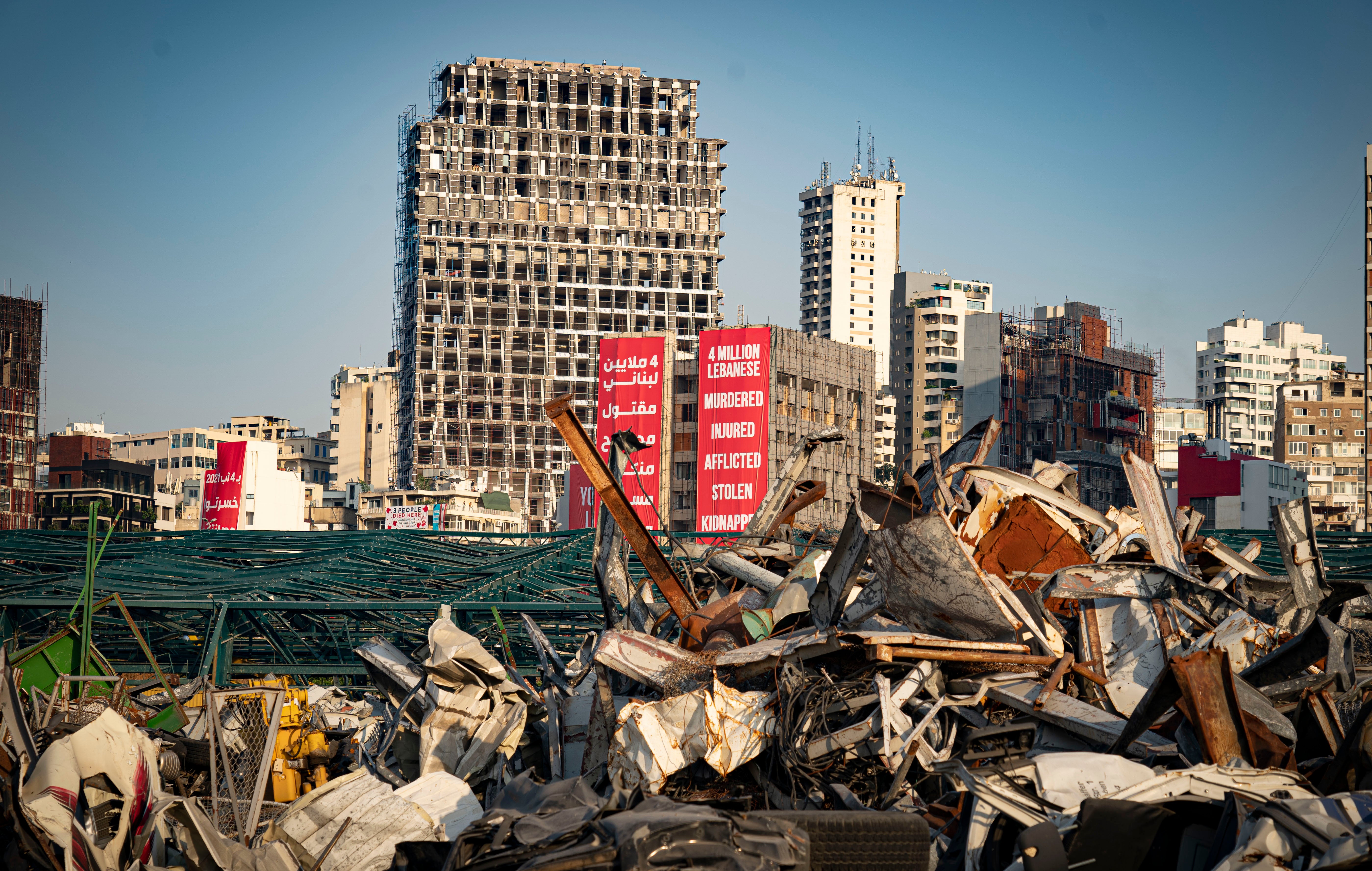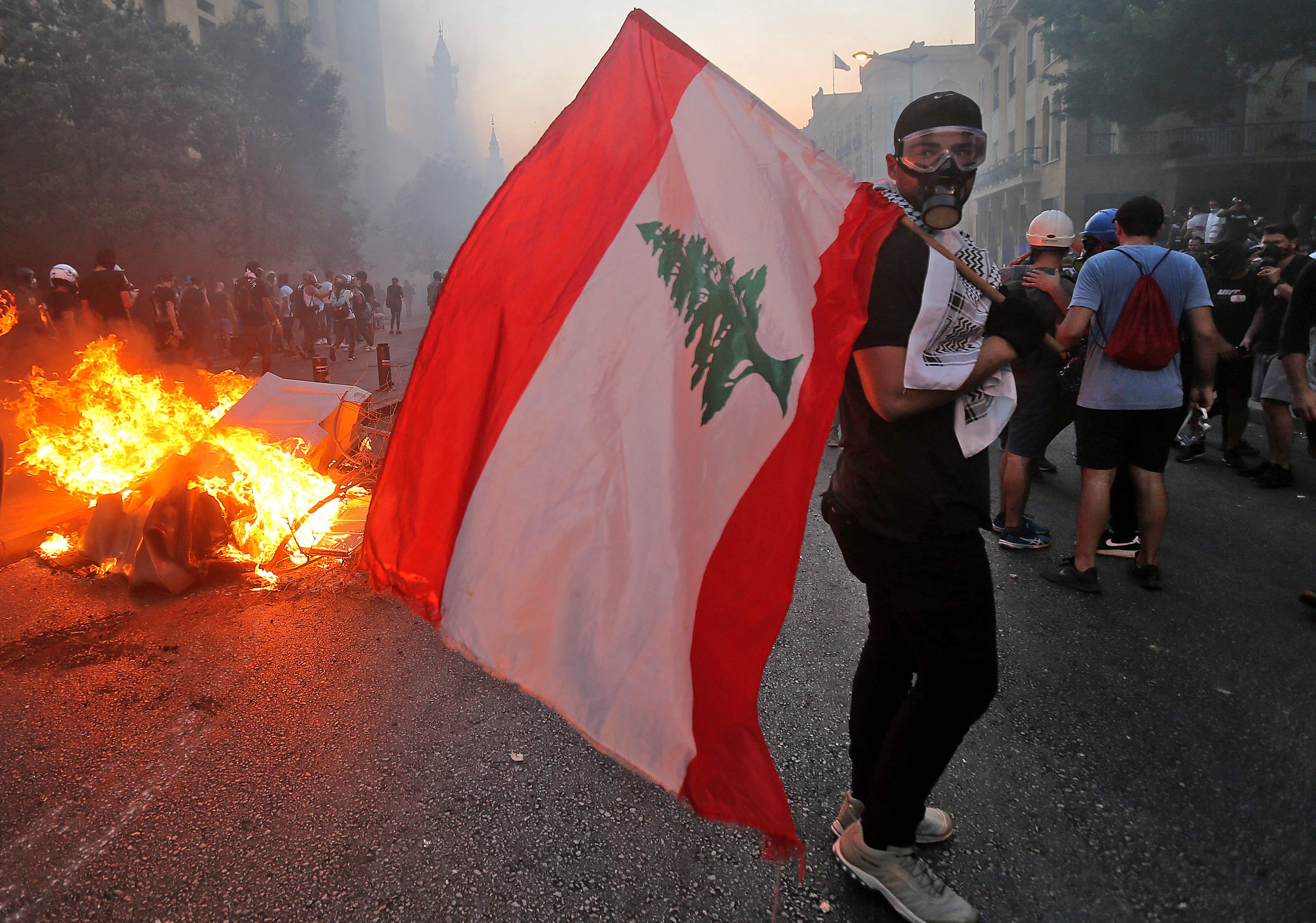Thousands of angry protesters fill the streets in Beirut on one-year anniversary of port explosion
More than 200 people were killed, 7,000 injured and 300,000 displaced by last year’s blast
Your support helps us to tell the story
From reproductive rights to climate change to Big Tech, The Independent is on the ground when the story is developing. Whether it's investigating the financials of Elon Musk's pro-Trump PAC or producing our latest documentary, 'The A Word', which shines a light on the American women fighting for reproductive rights, we know how important it is to parse out the facts from the messaging.
At such a critical moment in US history, we need reporters on the ground. Your donation allows us to keep sending journalists to speak to both sides of the story.
The Independent is trusted by Americans across the entire political spectrum. And unlike many other quality news outlets, we choose not to lock Americans out of our reporting and analysis with paywalls. We believe quality journalism should be available to everyone, paid for by those who can afford it.
Your support makes all the difference.Angry and in despair, thousands of Lebanese mourners and protesters took to the streets of Beirut on Wednesday demanding justice and regime change on the anniversary of a massive blast that killed more than 200 people and destroyed swathes of the capital city.
By sundown, tensions flared. Security forces fired volleys of tear gas, water cannon and rubber bullets at crowds that had marched on parliament wielding photos of the dead along with flags, nooses, and placards accusing the ruling elite of being murderers.
Earlier in the day, families of the victims had joined survivors to gather next to the port, the centre of the 4 August blast, where they remembered those who had been killed, and chanted in protest against the authorities they blame for the disaster.
Thousands lined the bridges that overlook the waterfront and cheered on fire-brigade trucks that were decorated with photos of the 10 firefighters who were killed trying to put out the fire at the port prior to the huge explosion.
Meanwhile, an international virtual donor conference, held on the same day to rally emergency aid for Lebanon’s crippled economy, raised $370m, according to French president Emmanuel Macron. US president Joe Biden said that the United States would give nearly $100m in additional humanitarian aid to Lebanon.

The explosion came amid Lebanon’s unprecedented financial crisis, which the World Bank has labelled one of the worst economic collapses in modern history. The country’s currency has lost nearly 90 percent of its value, and food prices have more than quintupled.
“There is more anger than grief today, because we have been given no space to grieve since no one has been held accountable; nothing has changed,” said Cyril, whose older sister Crystal al-Tham, 36, was killed on 4 August just a few streets from the centre of the blast.
Arm in arm with his mother, who was in tears, he added: “We are all acting like we are fine, but we are devastated inside.”
Further down the road, Tatiana clutched a photo of her father, Ghassen Hasrouti, a worker at the grain silo who was killed just a few metres from the warehouse where the stockpile of explosives that caused the explosion was stored.
“We have received nothing from the government,” she said in tears. “They are hiding behind their immunity. They are scared that if the truth gets out, they will all be in jail.”
More than 217 people were killed and 7,000 injured when hundreds, if not thousands, of tonnes of poorly stored ammonium nitrate exploded in Beirut’s port on 4 August 2020.
The blast displaced 300,000 people and caused widespread destruction and devastation. The World Bank estimated the cost of the physical damage from the explosion to be in the region of $4.6bn (£3.3bn).
A damning paper trail seen by The Independent shows that senior officials, from the port authorities to the prime minister, knew about a dangerous explosive stockpile since 2014 but did nothing about it.
A year later, there has been no accountability, and the investigation has yet to answer questions such as who ordered the shipment of the chemicals and why officials ignored repeated internal warnings of their danger.
Amnesty International this week accused the authorities of spending the past year “shamelessly obstructing victims’ quest for truth” and having “brazenly blocked and stalled justice at every turn”.
Human Rights Watch even called on the international community to impose targeted corruption sanctions on senior officials. The authorities, including the prime minister and president, have vehemently denied that they are to blame.
Prime minister Hassan Diab, who has been charged with negligence alongside three ex-ministers, said the charges against him were “preposterous”, adding that he had “done all within his power during the short period of time ... to address the issue of the ammonium nitrate stored at Beirut Port’s hangar 12”.
Lebanon’s president Michel Aoun, who also admitted to knowing about the stockpile but has not been summoned for questioning, did not address this issue. Instead, as of Tuesday, he was fully supportive of an impartial investigation.
A day of mourning was declared for Wednesday. Flags flew at half-mast over government institutions and embassies, and even medical labs and Covid-19 vaccination centres were closed to mark the day.
But at the protests, mourners, survivors, and citizens who had flocked to Beirut in solidarity were united in their condemnation of the president, prime minister and political parties.
Draped across buildings were six-storey-high banners bearing slogans such as “You lose your immunity” and “4 million Lebanese murdered, injured, afflicted, stolen, kidnapped”.
They are corrupt, animals, thieves and criminals
Later, protesters unfurled another huge banner with photos of the country’s leaders, including Hezbollah’s Hassan Nasrallah, President Aoun, and the former prime minister designate Saad Hariri.
At the bottom of the banner was the slogan: “Nitrate regime, ammonium militia”.
Fierce clashes erupted as the protests continued, when security forces fired intense barrages of teargas and rubber bullets into the crowds of protesters, pushing them from the traditional rallying ground of Martyr’s Square.
At the port, Leila Abdu, whose son Jack Baramakian, 31, was killed in his home in a building that overlooks the port, told The Independent: “They are corrupt, animals, thieves and criminals.
“No one has helped us. No one has even called us. They just murdered us and stole from the country.”
Meanwhile, a virtual conference co-hosted by France and the United Nations was held on Wednesday for the cash-strapped country, which managed to raise some $370m (£266m) in aid pledges to help meet the country’s humanitarian needs.
It drew together 33 states. Participants included Canada’s prime minister Justin Trudeau, Egypt’s president Abdel Fattah al-Sisi, King Abdullah II of Jordan, and European Council president Charles Michel.
The pledges, to be delivered over the next 12 months, surpassed the $357m target of the third global effort to show support for the Lebanese people, President Macron said.
France will provide €100m (£85m) in the coming months, Mr Macron said. Paris will also send 500,000 doses of Covid-19 vaccines to the country.
US president Joe Biden, who addressed the conference in a video message, pledged to give $100m (£72m) in new humanitarian assistance.
Back in Beirut next to the grain silo, an interfaith ceremony was held for the families of those killed. There, Lebanon’s top Christian cleric said the entire Lebanese people needed to know who was responsible for the tragedy.

“Justice isn’t just the demand of the families of the victims, but of all Lebanese,” Maronite Patriarch Bechara Boutros al-Rahi said.
“We want to know who brought in the explosives ... who allowed for their unloading ... who withdrew quantities (of explosives) from it and where it was sent,” he said.
At the Vatican, Pope Francis also marked the anniversary at his first weekly audience with the public since having surgery a month ago.
“A year after the terrible explosion in the port of Beirut, Lebanon’s capital, that caused death and destruction, my thoughts go to that dear country: above all to the victims, to their families,” the pontiff said.
“And so many lost the illusion of living,” he added.
Join our commenting forum
Join thought-provoking conversations, follow other Independent readers and see their replies
Comments